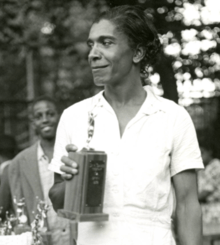Ora Washington
Ora Belle Washington (c. 1899 – December 21, 1971) was an American athlete from the Germantown neighborhood of Philadelphia, Pennsylvania.[1] Washington was inducted into the Women's Basketball Hall of Fame in 2009.
 | |
| Country (sports) | |
|---|---|
| Born | 1899 Philadelphia, Pennsylvania |
| Died | December 21, 1971 (aged 72–73) Philadelphia, Pennsylvania |
Early life
Ora Washington was born in Virginia around 1899 to James Thomas Washington and Laura Young Washington. The exact date of her birth is unknown; after the American Civil War, the state of Virginia was in debt and to save money did not issue birth certificates from 1896 to 1912. The fifth of nine children, she grew up in the farming community of File located in Caroline County, Virginia. Despite owning their own farm, a better position than sharecropping, the economy was poor. In 1908, Laura Washington died in childbirth adding further strain to the family's finances, and by 1910 the family farm had been mortgaged and James Washington had been unemployed for a number of months. Like other African Americans during the great migration, the Washingtons moved north in the mid 1910s looking for better economic opportunities.[2]
Career
Washington began playing tennis in the early 1920s around the time that her older sister, Georgia, died of tuberculosis. In 1924, she went on to win the Wilmington, Delaware city championships in singles, doubles, and mixed doubles. The following year, she defeated the reigning national singles champion Isadore Channels. She won her first national title in 1925 with Lula Ballard at the American Tennis Association's national doubles tournament, which she would continue to win for the next eleven years. After moving to Chicago in 1929, Washington won her first singles championship that same year when she defeated Frances Gittens in three sets.[2] She would win the title seven more times by 1937.[1] Despite a desire to play in United States Lawn Tennis Association tournaments, that organization maintained their policy of racial segregation until 1948, after Washington had retired from tennis.[2]
She played basketball first in 1930 with the Germantown Hornets where her 22–1 record earned her the national female title. The Hornets were originally sponsored by a local YMCA, but they separated from the YMCA and became a fully professional team.[3] The following year, Washington led the Hornets to thirty-three consecutive victories. Their opponents included African American women's teams, white women's teams and occasionally African American men's teams. In one game against the male Quicksteppers in January 1932, they stayed close and then on a last second basket by Evelyn Mann, the Hornets emerged victorious.[3]
Later, playing with the Philadelphia Tribune Girls from 1932–1942, she was the team's center, leading scorer, and coach.[1] Washington played for the Tribunes in a three-game event against Bennett College in 1934. The Tribunes won all three games, the second of which was described by the Chicago Defender as "the greatest exhibition ever staged in North Carolina".[4] The Tribune Girls won 11 straight Women's Colored Basketball World's Championships. Washington was said to be "the best Colored player in the world."[5]
Washington never played the top white tennis player of the time, Helen Wills Moody, because Moody refused to schedule a match.[6] She retired from sports in the mid-1940s, after she and partner George Stewart defeated Walter Johnson and upcoming superstar Althea Gibson to win the 1947 ATA mixed doubles title.
For the remainder of her life, she supported herself as a housekeeper. She died in 1971 in Germantown and was buried in her Virginia hometown.[1]
Honors and tributes
In the mid-1980s, she was inducted to Temple University's Sports Hall of Fame.[1]
A state historical marker stands at the location of the Colored YWCA where she taught and played, at 6128 Germantown Avenue, Philadelphia, now home to Settlement Music School.[1][7]
In 2009, Washington was elected to the Women's Basketball Hall of Fame, located in Knoxville, Tennessee.[8]
On March 31, 2018, it was announced she was being inducted as part of the Basketball Hall of Fame class of 2018.[9]
On July 31, 2019, a statue inspired by Washington, titled "MVP, was added to Smith Playground in Philadelphia's Fairmount Park.[10]
References
- Edmonds, Arlene November 10, 2004. The Leader, "State Historic Marker dedicated - Tennis and basketball legend remembered". Accessed May 2, 2008. Archived May 17, 2005, at the Wayback Machine
- Grundy, Pamela (2006). "Ora Washington: The First Black Female Athletic Star". Out of the Shadows: A Biographical History of African American Athletes. pp. 79–92.
- Jennifer H. Lansbury (1 April 2014). A Spectacular Leap: Black Women Athletes in Twentieth-Century America. University of Arkansas Press. pp. 29–30. ISBN 978-1-61075-542-9.
- Wiggins, David (2003). The unlevel playing field : a documentary history of the African American experience in sport. Urbana: University of Illinois Press. pp. 120–121. ISBN 978-0252028205.
- "All Hail The Philadelphia Tribune Girls". Accessed May 2, 2008.
- Pennsylvania Historical and Museum Commission. "Image". Accessed 20 May 2008.
- Pennsylvania Historical and Museum Commission. "Search for Historical Markers Archived 2006-10-14 at the Wayback Machine". Accessed May 1, 2008.
- "WBHOF Inductees". Wbhof.com. Retrieved 2009-08-01.
- "Ora Mae Washington, Hall of Fame's trail-blazing inductee". Sports Illustrated. Retrieved 2018-04-01.
- "One-of-a-kind statue unveiled at Smith Playground in South Philly". Whyy.org. Retrieved 5 August 2019.
Further reading
- Johnson, Claude (April 1, 2018). "Trailblazer Ora Mae Washington should be in the Naismith Memorial Basketball Hall of Fame". The Undefeated.
- Grundy, Pamela. "Ora Washington: The First Black Female Athletic Star," in Wiggins, David K. (editor) Out of the Shadows: A Biographical History of African American Athletes. University of Arkansas Press, 2006.